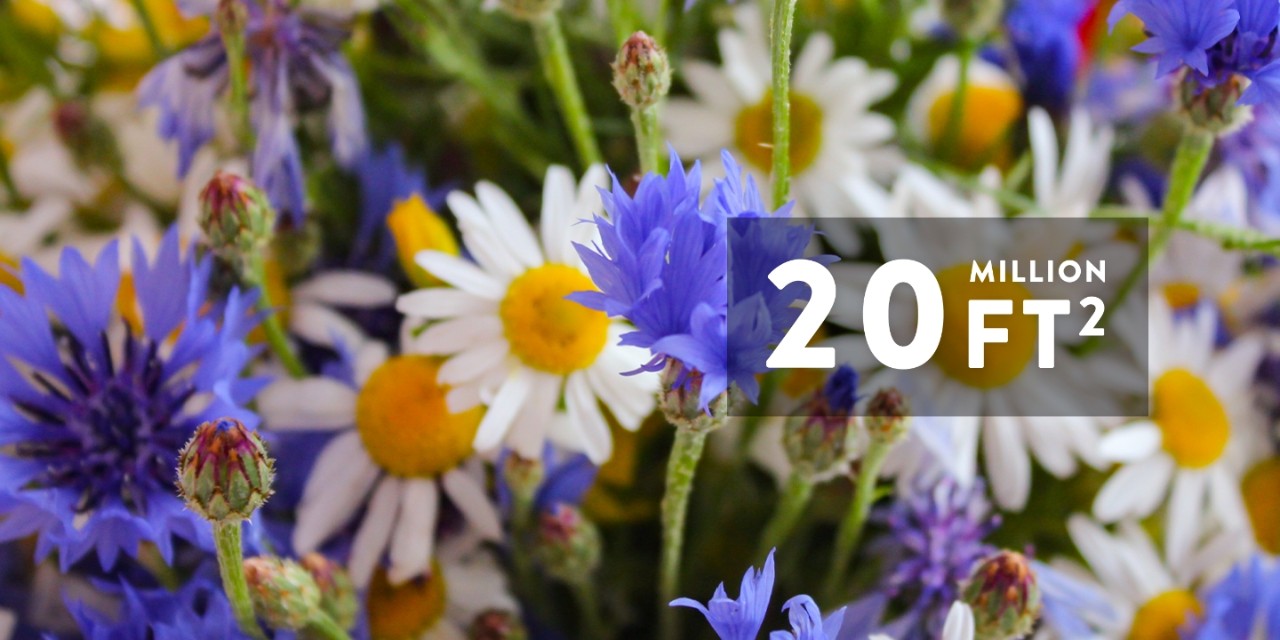Our Pledge to Nature
The steps we’re taking
Our #BringNatureBack initiative recognises that we’ve lost around 97% of our native wildflower meadows in Britain since the 1930s, which in turn affects all that a meadow produces; from supporting plants and animals like orchids, bumblebees, dormice, butterflies, moths and goldfinches, to its vibrant colours, fragrances, the food it produces.
- Restoring existing meadows and other grassland habitats that need our help.
- Preserving and managing current flower-rich grasslands, including the establishment of sustainable management practices.
- Creating new wildflower grassland habitats, including on floodplains and other wet habitats.
- Enhancing on-farm grazing pasture, particularly looking at increasing grassland diversity and reducing overgrazing so that flowering plants can flourish.
- Establishing diverse wildflower habitats to increase pollen and nectar sources for pollinators and other beneficial insects.
See us in action
We’re already putting in the groundwork to get many of these projects underway. From growing wildflowers on road verges, to planting in local farms, schools and floodplains, you can see what we’re getting up to in more detail here.
How you can get involved
Of course, the more we can offer nature, the more it can offer us in return. We’re always looking for more hands to help us, and we’ve put together some handy tips on how you can get involved from your very own home.
Want to know what other actions you can take for nature around the world? WWF is working for a future where nature is in recovery. Everyone can get involved to help protect our planet. Find out more at wwf.org.uk.
Botanica Estates with Steve Backshall
To shine a light on this critical issue, wildlife expert Steve Backshall has stepped up as the first ‘wildflower habitat estate agent’ from “Botanica Estates” encouraging us to get on the wildlife property ladder and support the restoration of precious UK wildlife under threat by re-creating your own ‘wildflower homes’. Even if you only have just 1 sq. ft you can turn a corner of your garden, windowsill, doorstep into a wildflower haven giving these plant and animal species the opportunity to thrive once again. To help you on your journey to support the plants and animals that need us, Steve has compiled his top tips, giving you and your family the inspiration you might need to create a wildlife home and add to the ‘new homes’ listing of Botanica Estates.
1. The first step is shifting your mindset around gardening. Tidy gardens may look nice but they are far less hospitable for creatures – from bees and beetles to birds and small animals – like your neighbourhood hedgehog! Don’t be afraid to let your outdoor spaces grow a little wild as wildflower habitats have traditionally provided a home for these species to thrive in!
2. If space is an issue, you can make use of a flower box and grow native wildflowers or other insect-friendly plants on your windowsill, balcony or even local community, such as community gardens and local parks – just remember to get permission from the owner of the land first.
3. Say goodbye to the pesticides, weedkillers, slug pellets and fertilisers in the back of the garden shed and remember to dispose of them safely! Your garden ecosystem is in a delicate balance and chemical herbicides and pesticides upset that balance.
4. You can use your garden, whatever size it is, to make positive choices for wildlife. Choose at least some plants that are native – whether trees or shrubs, hedges or wildflowers – and others that are attractive to insects. For example, buddleia is great for butterflies, whilst lavender, Verbena bonariensis and Echinops all provide pollen and nectar for bees.
5. Think vertical too. Growing ivy along walls and other vertical surfaces is a great idea. Native ivy is a superb wildlife host – a source of food for birds and insects, shelter for nests and a food source for caterpillars.
6. Give the lawnmower a break. Taking a break from mowing your lawn (or a significant area of it) will encourage the growth of nectar-rich plants, such as clovers or dandelions. These plants provide a vital food source for pollinators.
7. Invest in a bug hotel or even build one yourself using material kept back from pruning your trees and shrubs. Bug hotels are a fantastic way to provide shelter for a whole range of insects.
8. Consider a garden pond. The single best thing for biodiversity in a small space is to add water and you really don’t need much space! This will attract frogs, newts, pond snails and damselflies.
9. Keep the birds happy with a well-stocked bird table or feeder. The wider the range of foods on offer – such as dried fruit and nuts – the wider the range of feathered friends that will come calling.
10. Start a “bring nature back” movement! Start a conversation with your neighbours about what you could do together to support local wildlife. Open up your garden boundaries to create corridors for wildlife and share the responsibility of providing food, shelter and habitats to help preserve our endangered species. This is not only good for the animals but our communities too! Spending time outdoors is great for our personal health and wellbeing.
-

-

